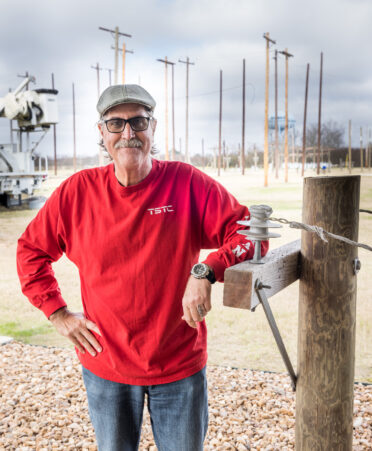(ROSENBERG, Texas) – During seasons of bad weather and cold temperatures, there may be no job more important than that of the electrical lineworker for keeping your house running smoothly.
Ronald Jones, lead instructor for the Electrical Lineworker and Management Technology program at Texas State Technical College in Fort Bend County, has had many job-related experiences, dealing with everything from freezing temperatures to hurricanes.
Jones worked in the field for 38 years before applying for a position at TSTC in 2017. Since then, he has seen the program grow from eight students when he started to well over 70 students a semester today. He finds lineworker jobs to be some of the most crucial in Texas.
“When they see a hurricane in the Gulf and know it is coming, they let us (lineworkers) go home and get our houses ready, get our families ready,” he shared. “When everyone else leaves, we are not leaving. We stay behind, get ready.”
Lineworkers are some of the first to respond in the aftermath of a storm. Jones has worked in the aftermath of many storms, including hurricanes Katrina and Brett. Repair normally takes somewhere between 15 to 20 days of 14-plus-hour days.
“Ice storms, on the other hand, are a whole different game,” Jones said. “During hurricanes, it is hot so you are drinking lots of water and getting shade when you can. Ice storms are cold. You focus on staying as bundled as possible.”
Without lineworkers, however, power does not come back on and people cannot resume their normal lives. Jones recalled noticing lineworkers during the recent freeze in December. Those working in his neighborhood worked through the night to restore power to him and his neighbors.
While lineworkers do their best to restore power and keep everyone’s electricity running smoothly, Jones shared a few tips to keep in mind.
“Make sure all of your flashlights and lanterns work,” he said. “Keep extra batteries on hand.”
Additionally, he said keeping your pipes wrapped in insulation during ice storms can keep them from bursting. If you have a fireplace, using it throughout the storm and when you do not have power can keep your place, and your pipes, warm.
When roads are bad, stay off of them. Pay attention to the weather, and do your shopping in advance of poor weather. Extra water and food are a necessity.
His final tip was to be patient with the lineworkers. They are out there working hard to get your and your neighbors’ power back on.
“Eventually the lights will come back on. That is thanks to the lineworkers,” Jones said.
TSTC offers an Associate of Applied Science degree and a certificate of completion in Electrical Lineworker and Management Technology at the Fort Bend County, Harlingen, Marshall and Waco campuses. The program is one of nine Money-Back Guarantee programs in which tuition is refunded if the participating graduate has not found employment in their field of study within six months of graduation.
According to onetonline.org, electrical power-line installers and repairers in Texas can earn a median salary of $63,770 a year. The website projected that there would be a 24% increase in the number of such jobs in the state from 2020 to 2030.
For more information about TSTC, go to tstc.edu.
